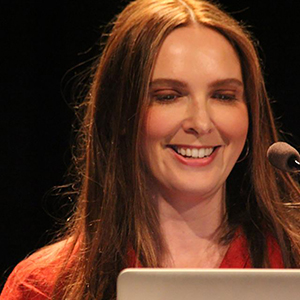Karen Stollznow
 Karen Stollznow
Karen Stollznow
No offence
“She looks good for her age”; “That’s so gay”; “Boys will be boys”; “I’m not a racist, but …” are hurtful phrases, slurs and stereotypes that are engrained in the English language. They also have enormous power to offend, as UNE alumna, linguist and author Karen Stollznow knows all too well.
Her book On the Offensive: Prejudice in Language Past and Present draws extensively on her PhD research at UNE back in the early 2000s, after she’d completed undergraduate studies in linguistics. “I was drawn to the scientific study of language because of the deep insights it provides into people, culture and history,” Karen says. “My area of expertise – semantics – is all about the meaning in language, and my research has considered the way language explodes many of the myths, folk beliefs and prejudices of society.”
On the Offensive explores the origins and impacts of racism, sexism, ableism and all the other ‘-isms’ that plague our communications. It’s a veritable minefield of overt and more veiled offence to negotiate.
“We have all offended or been offended by language at some time in our lives,” Karen says. “The global pandemic and current political climate serves to highlight the social and cultural inequities and anxieties that exist.
“What is offensive is very context dependent, and changes across time and culture. It’s important to educate ourselves about what is offensive and why, so we can be aware of how our language is perceived by others. Words carry history and baggage, and say a great deal about our attitudes, beliefs and biases.
“To me, the value and importance of avoiding offensive language is quite simple. It's about showing politeness and respect in the way we communicate with others.”
Many prejudices persist about race and ethnicity, gender identity and sexuality, religion, health and disability, physical appearance or age. An ill-chosen term or slip-of- the-tongue can cause unintended offence.
However, Karen also draws on more deliberate examples of discrimination, some from historical and contemporary Australia, including the Stolen Generations, White Australia Policy and the misogynistic language used by former Opposition Leader Tony Abbott to describe former Prime Minister Julia Gillard.
These days Karen lives in Denver, Colorado, where she works as a researcher and writes books, having first travelled to the US while completing her PhD to undertake research at the University of California, Berkeley. While there, Karen became involved in the Script Encoding Initiative, researching endangered writing systems (such as Rongo Rongo, used on Easter Island) that would otherwise have been lost to the digital age.
“My studies at UNE gave me an excellent grounding for my subsequent career in teaching and research,” Karen says. “Being an external student and then completing a research-based doctorate taught me autonomy and independence. Later, I also spent time working as a teaching assistant and lecturer for UNE’s highly regarded Master of Applied Linguistics degree program.
“I feel nostalgic about my time at Armidale. To this day, I have maintained many of the friendships and professional relationships I developed, and whenever I'm back home in Australia I make time for a stopover in Armidale to catch up with friends and former colleagues.”
And the good news on the use of discriminatory language?
“Most people don't mean to offend, and I think the use of overtly offensive language is on its way out,” Karen says. “We are more concerned about politeness and inclusiveness today and less tolerant of prejudice. Now, when we talk about offensive words, they represent only a small part of the English language.”

